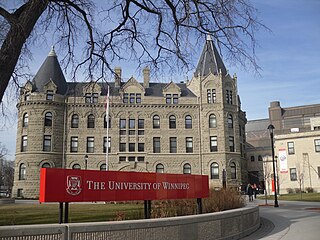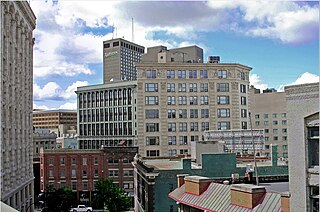
Winnipeg is the capital and largest city of the province of Manitoba in Canada. It is centred on the confluence of the Red and Assiniboine rivers, near the longitudinal centre of North America.

Infoshops are places in which people can access anarchist or autonomist ideas. They are often stand-alone projects, or can form part of a larger radical bookshop, archive, autonomous social centre or community centre. Typically, infoshops offer flyers, posters, zines, pamphlets and books for sale or donation. Other items such as badges, locally produced artworks and T-shirts are also often available. Infoshops can also provide printing and copying facilities for people to produce their own literature or have a meeting space.
Anarchism in the United States began in the mid-19th century and started to grow in influence as it entered the American labor movements, growing an anarcho-communist current as well as gaining notoriety for violent propaganda of the deed and campaigning for diverse social reforms in the early 20th century. By around the start of the 20th century, the heyday of individualist anarchism had passed and anarcho-communism and other social anarchist currents emerged as the dominant anarchist tendency.
The Communist Party of Canada (CPC) fielded a number of candidates in the 2000 Canadian federal election, none of whom were elected. Information about these candidates may be found here.

The Exchange District is a National Historic Site of Canada in the downtown area of Winnipeg, Manitoba, Canada. Just one block north of Portage and Main, the Exchange District comprises twenty city blocks and approximately 150 heritage buildings, and it is known for its intact early 20th century collection of warehouses, financial institutions, and early terracotta-clad skyscrapers.

Metelkova is an autonomous social and cultural centre in the city centre of Ljubljana, Slovenia's capital city. Formerly, the site was the military headquarters of the Army of the Austro-Hungarian Empire, then it became the Slovenian headquarter of the Yugoslav National Army. It consists of seven buildings extended over a total area of 12,500 m², which have been squatted since September 1993. The squat is named after nearby Metelko Street, which is named after the 19th-century Slovenian Roman Catholic priest, philologist, and unsuccessful language reformer Fran Metelko.
The Mondragon Bookstore & Coffeehouse was a political bookstore and vegan cafe located in The Old Market Autonomous Zone at 91 Albert Street in Winnipeg, Manitoba, Canada. The name comes from the Mondragón Cooperative Corporation and other organisations in the Basque town of Mondragón Spain that is known for its extensive network of worker's cooperatives.
The history of the cooperative movement concerns the origins and history of cooperatives across the world. Although cooperative arrangements, such as mutual insurance, and principles of cooperation existed long before, the cooperative movement began with the application of cooperative principles to business organization.
Arbeiter Ring Publishing, now known as ARP Books, is a worker-owned and operated independent book publisher and distributor that specializes in progressive, radical and anarchist literature. Founded by Todd Scarth and John K. Samson in Winnipeg in 1996, the publishing company was originally based in The Old Market Autonomous Zone, which also houses Mondragon Bookstore and Coffee House, and other radical and worker-run organizations. Named after Arbeiter Ring, a radical Jewish workers' organization, Arbeiter Ring also shares a commitment to workers' self-management. One aspect of this is the organization's promotion of participatory economics, an alternative economic model first articulated by Michael Albert and Robin Hahnel.

Milly Witkop(-Rocker) was a Ukrainian-born Jewish anarcho-syndicalist, feminist writer and activist. She was the common-law wife of the prominent anarcho-syndicalist leader Rudolf Rocker. The couple's son, Fermin Rocker, was an artist.
Anarchism in Canada spans a range of anarchist philosophy including anarchist communism, green anarchy, anarcho-syndicalism, individualist anarchism, as well as other lesser known forms. Canadian anarchism has been affected by thought from the United States, Great Britain, and continental Europe, although recent influences include a look at North American indigenism, especially on the West Coast. Anarchists remain a focal point in media coverage of globalization protests in Canada, mainly due to their confrontations with police and destruction of property.

Nationalism and Culture is a nonfiction book by German anarcho-syndicalist writer Rudolf Rocker. In this book, he criticizes religion, statism, nationalism, and centralism from an anarchist perspective.
Aqua Books was a Canadian independent bookstore opened in Winnipeg, Manitoba by Kelly Hughes in 1999. It was acknowledged for helping revitalize downtown Winnipeg and creating an eclectic mix of programs and events for the Winnipeg arts and culture community. Aqua Books closed in early 2012, and after a failed attempt to reopen in a new location, closed permanently later that year.
Dylan Miner is an artist and assistant professor at Michigan State University.
Collective Opposed to Police Brutality (C.O.B.P), also known as Collectif Opposé à la Brutalité Policière, is an autonomous group founded in Montreal in 1995. The organization consists of victims, witnesses, representatives of ethnic communities, marginalized youth, small political groups, the homeless, sex workers, gay, lesbian, and transgender people, youth, drug users, or ordinary citizens who have questions about police authority.
Workers' self-management, also referred to as labor management and organizational self-management, is a form of organizational management based on self-directed work processes on the part of an organization's workforce. Self-management is a defining characteristic of socialism, with proposals for self-management having appeared many times throughout the history of the socialist movement, advocated variously by democratic, libertarian and market socialists as well as anarchists and communists.

Johann Rudolf Rocker was a German anarchist writer and activist. Though often described as an anarcho-syndicalist, he was a self-professed anarchist without adjectives, believing that anarchist schools of thought represented "only different methods of economy" and that the first objective for anarchists was "to secure the personal and social freedom of men".
Self-managed social centers, also known as autonomous social centers, are self-organized community centers in which anti-authoritarians put on voluntary activities. These autonomous spaces, often in multi-purpose venues affiliated with anarchism, can include bicycle workshops, infoshops, libraries, free schools, free shops, meeting spaces and concert venues. They often become political actors in their own right.







